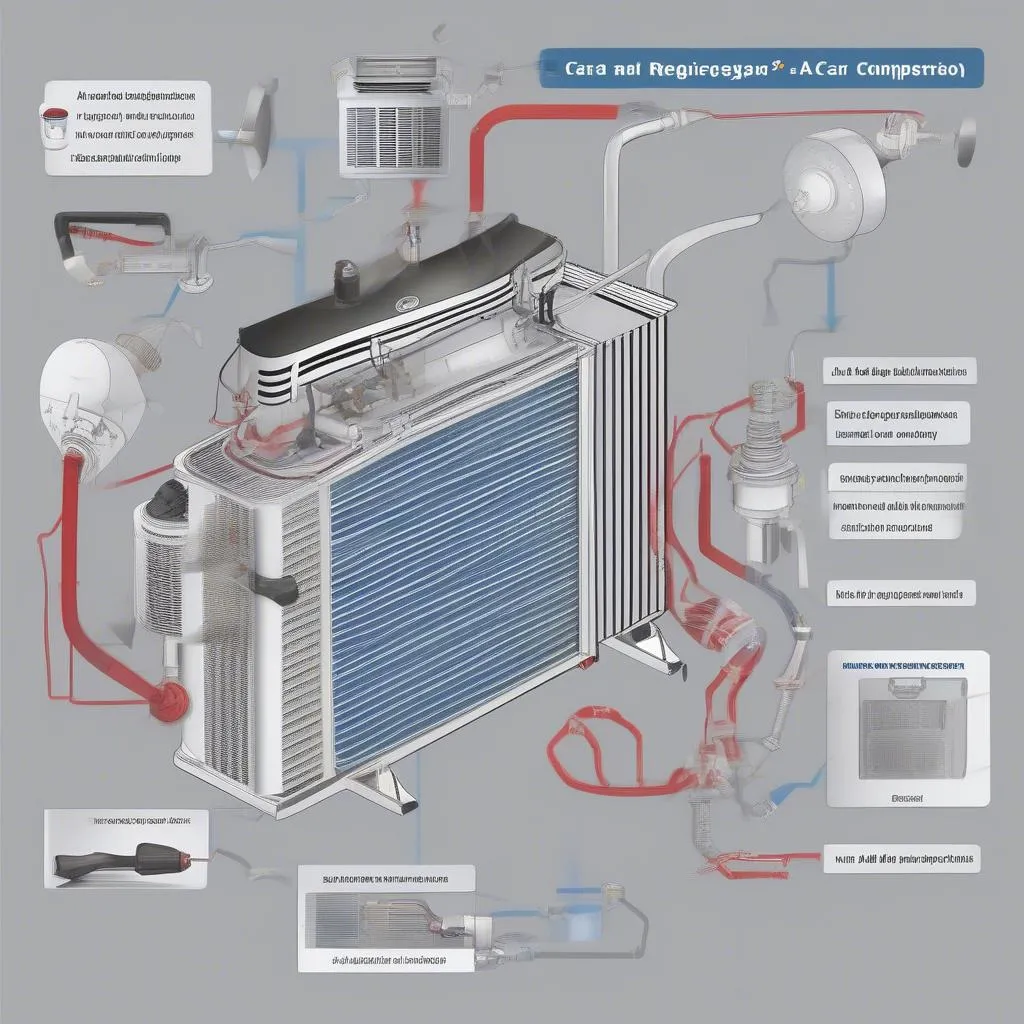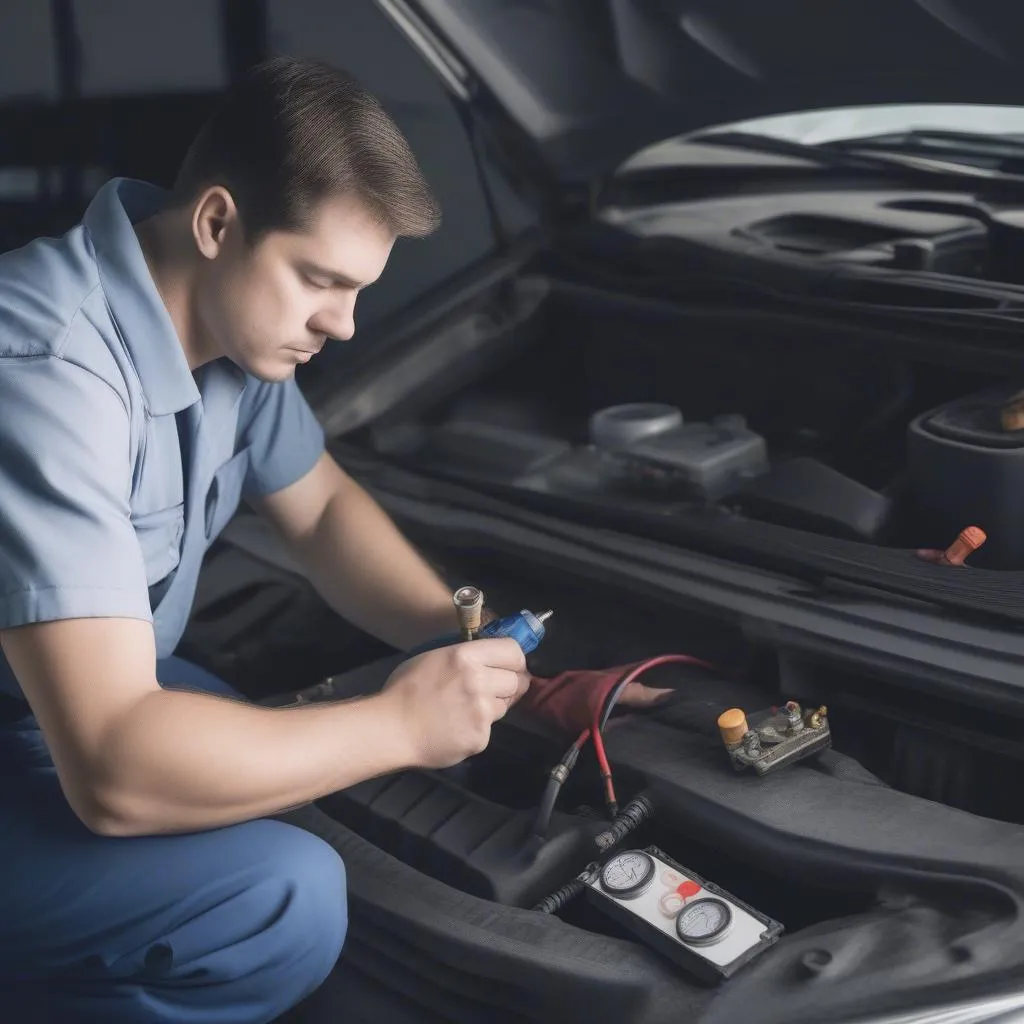Have you ever been driving down the road on a hot summer day, only to have your AC suddenly blow warm air? This can be incredibly frustrating, especially if you’re stuck in traffic or trying to enjoy a long road trip. One common culprit behind this problem is high AC pressure on the high side of your system.
What Does High AC Pressure Mean?
The AC system in your car works by circulating a special refrigerant that absorbs heat from the air inside your car. This refrigerant is compressed and cooled before being released back into the cabin, creating cool air. The high side of the system refers to the part where the refrigerant is compressed and under high pressure.
Here’s why high pressure on the high side can be a problem:
- Overheating: A high-pressure system can lead to overheating of the compressor, which is a major component of the AC system.
- Damage to the system: Excessive pressure can damage other parts of the AC system, such as the condenser, hoses, and even the compressor itself.
- Reduced cooling capacity: The system may not be able to cool the air effectively if the pressure is too high.
What Causes High AC Pressure?
Several factors can contribute to high AC pressure on the high side of your car’s AC system. Here are a few common culprits:
- Overcharged refrigerant: If your AC system has too much refrigerant, it can create excessive pressure.
- Blocked condenser: The condenser is responsible for cooling the refrigerant. If it gets blocked by debris, dirt, or other obstructions, it can lead to high pressure.
- Faulty expansion valve: The expansion valve helps regulate the flow of refrigerant, and a faulty valve can cause pressure imbalances.
- Leaking compressor: A leaking compressor can introduce moisture into the system, which can cause pressure buildup.
- Faulty pressure switch: The pressure switch is responsible for monitoring the pressure in the system and shutting it down if it gets too high. A faulty switch can lead to high pressure and potentially damage the system.
How to Troubleshoot High AC Pressure
Remember, working with AC systems requires specialized knowledge and tools. It’s generally recommended to consult a qualified technician for diagnosis and repair.
However, you can try these steps to get a basic understanding of the problem:
- Check the refrigerant level: You can use a gauge to check the refrigerant level. If it’s too high, you’ll need to have some of it removed.
- Inspect the condenser: Visually inspect the condenser for any blockages or damage.
- Check the expansion valve: A faulty expansion valve can cause pressure imbalances.
- Inspect the compressor: Check for leaks and signs of damage.
- Test the pressure switch: A faulty pressure switch can lead to high pressure.
What to Do if You Suspect High AC Pressure
It’s important to get your car checked by a qualified technician as soon as possible if you suspect high AC pressure. Delaying repairs can lead to more serious damage to your AC system.
Here are some common questions about high AC pressure:
Q: What are the symptoms of high AC pressure?
A: Warm air blowing from the vents, a loud hissing or rattling noise from the AC system, and a reduction in AC performance are common symptoms.
Q: Can I fix high AC pressure myself?
A: While there are some basic steps you can take to troubleshoot the problem, it’s generally recommended to consult a qualified technician. Working with AC systems requires specialized knowledge and tools, and improper repairs can be dangerous.
Q: How much does it cost to fix high AC pressure?
A: The cost of fixing high AC pressure can vary depending on the cause of the problem and the complexity of the repair. A simple refrigerant recharge might cost a few hundred dollars, while a more serious repair, such as replacing the compressor, could cost several thousand dollars.
Q: Can I prevent high AC pressure?
A: You can help prevent high AC pressure by regularly maintaining your AC system, including:
- Checking the refrigerant level: Have your refrigerant levels checked annually.
- Keeping the condenser clean: Clean the condenser regularly to remove any debris or dirt.
- Performing regular AC maintenance: Have your AC system serviced regularly to prevent problems from developing.
Q: What happens if I ignore high AC pressure?
A: Ignoring high AC pressure can lead to more serious damage to your AC system, including a complete failure. It can also cause damage to other components of your car, such as the engine and electrical system.
 Car AC System Diagram
Car AC System Diagram
Where to Find AC Repair
If you’re having AC problems, it’s important to find a qualified technician to diagnose and repair the issue. Many car dealerships and independent repair shops have experienced AC technicians who can help you.
Remember, don’t delay getting your car checked if you suspect high AC pressure. It’s important to get the problem addressed promptly to prevent further damage and ensure your AC system is running smoothly.
 Car AC Maintenance
Car AC Maintenance
